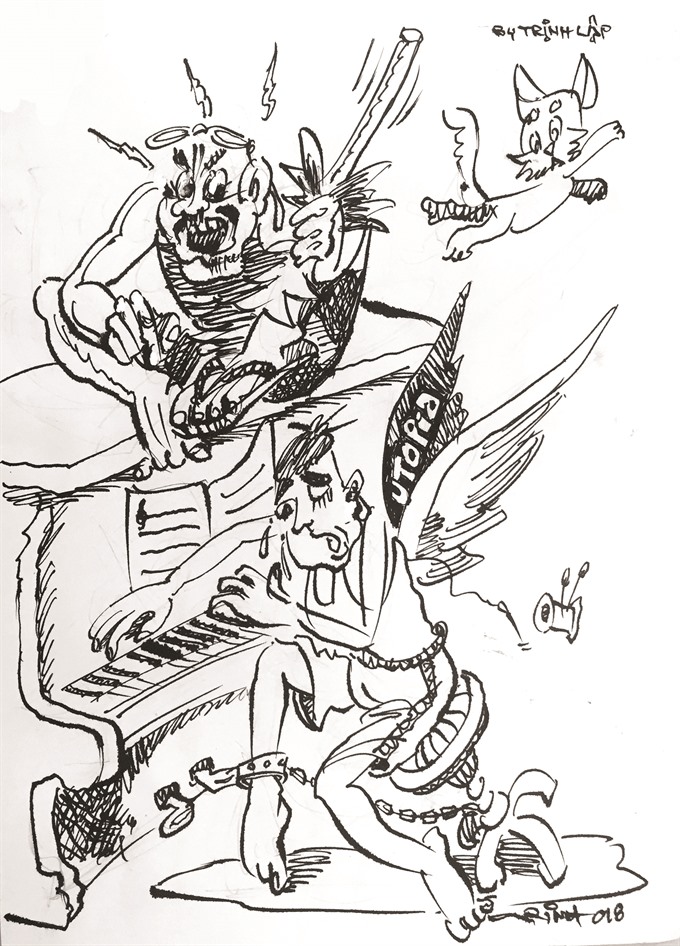 Sunday/Weekend
Sunday/Weekend

"Lang Lang is coming to town. How can I get tickets to his concert?" a mother of two musically inclined children begs friends on her Facebook account.
 |
by Nguyễn Mỹ Hà
"Lang Lang is coming to town. How can I get tickets to his concert?" a mother of two musically inclined children begs friends on her Facebook account.
The famed concert pianist’s performance is scheduled for the last day of August, but social media groups have already been busy chatting about him. Brought to Việt
Phạm Linh, a Hanoian mother of two daughters studying piano and violin, was waiting for her second translated book to hit the stands when she learned that its main character and author would be coming to town. Co-written by Lang Lang and David Ritz, the book Lang Lang, Journey of a Thousand Miles — My story tells a story of great will power, personal sacrifice and ultimate dedication to achieve greatness in music.
Scheduled to hit bookshelves on August 26, Phạm Linh’s translation of the book has been sent to early readers and received a great deal of interest among them, especially students of music and their parents.
"It was just a coincidence," she told Việt Nam News of the timing of the publication of the book, her second translation of a musical memoir.
Her interest in translating musical memoirs began with her own children’s music studies.
"My elder daughter, now 14, is now in her sixth year violin at the [Viêt Nam Academy of Music]," Linh said. "She switched to violin after four years studying piano, and winning some child competitions. But she one day decided to try out the violin and she just loved it."
But as a parent with no musical background nor any family members who had much musical experience, Linh found herself pushing her children down the rough musical path without any guidance. "I looked around in bookstores and couldn’t find any books in Vietnamese on this topic, so I started to read books in English."
Linh’s first translated book was Strings Attached, by Joanne Lipman & Melanie Kupchynsky, about a devoted Ukrainian teacher who taught violin to children in the
Linh said she keeps wondering, What’s next? If my children keep on doing what they do now, and become professional musicians, then who they are going to perform for?
"What are they going to become?" Linh says she asked the music teachers a couple of times. "They will be music teachers!" was the answer she got.
Linh said she was not quite happy with the answer, though it reflects the reality for many classical musicians in the country. They were talented as children and took on arduous training for at least 12-15 years to become a musician. But they do not have as many gigs as they would like to.
"The public is not ready to pay for classical music concerts," Linh said she noticed. "If my children play, then they need to have an audience and the audience must be larger, not just family and relatives of the little artists. I want to translate books to reach out to more people so that they become interested."
At first she could not find a local publisher who was willing to invest on her translation of Lang Lang’s book. "’Excuse me, your book’s about music, a young man who become known worldwide? It’s quite hard to sell’", she says publishers told her.
Finally, the first edition will be 2,000 copies and distributed via bookshop. There will be no launching party, no readings and no signings.
"I completely understand the pressure, the frustration described in the book, because we have also been through that," shares another mother who read the book. Her 14-year-old daughter is studying music at the Việt Nam Academy of Music and taking part in summer festival abroad.
"She loves music, so we will keep on going,” the mother concludes.
Others have chimed in to share about their own experiences, citing the motto, "No pain, no gain". Some really admired the book’s story, praising the role of Lang Lang’s father, who would not leave any stone unturned to usher his son to international stardom at a very young age.
"It’s a very inspiring story," Linh says. "But not everyone studying music shall or needs to follow that path."
Linh says that sometimes, when a child receives appraisal too early, based on his or her initial success, it does more harm than good. The most dangerous thing for a young artist is to be aware of their success and stop trying to improve themselves.
"I also witness first-hand my child’s first so-called ‘failure’, when she worked so hard to win a competition. She came second after winning first at a previous competition. My girl burst out crying right there on the stage when she heard her name.
Linh says she’ll try her best to bring both of her children to hear Lang Lang play. "We would love to go to the concert, even if we only get standing tickets," Linh says. — VNS




